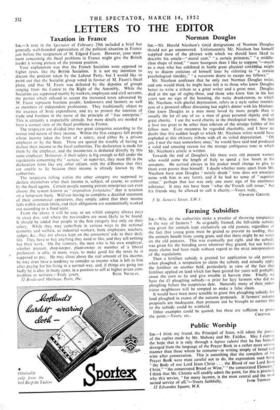LETTERS TO THE EDITOR
Taxation in France
Sta,—A note in the Spectator of February 29th included a brief but generally well-founded appreciation of the political situation in France just before the resignation of M. Edgard Faure. However, your state- ment concerning the fiscal problems in France might give the British reader a wrong picture of the present position.
Your explanation was that the French Socialists were opposed to higher taxes, like the British Socialists. It is not my intention to discuss the position taken by the Labour Party, but 1 would like to point out that the Socialist group voted in favour of M. Faure's fiscal plans, and that M. Faure was defeated by the deputies of groups ranging from the Centre' to the Right of the Assembly. While the Socialists are supported mainly by workers, employees and civil servants, the parties which refused to accept the increased taxes advocated by M. Faure represent business people, landowners and farmers as well as members of independent professions. They traditionally object to the excesses of State expenditure, and try to protect the interests of trade and business in the name of the principle of " free enterprise." This is certainly a respectable attitude, but more details are needed to have a correct view of the fiscal problems in France.
The taxpayers are divided into two great categories according to the source and nature of their income. Within the first category fall people whoe income takes the form of a salary, paid either by a private employer or by the State. These are spared the trouble of having to declare their income to the fiscal authorities. The declaration is made for them by the employer, and the income-tax is deducted directly by this same employer. Moreover, if their salary is big enough to -fall under the regulations concerning the "stir/axe," or super-tax, they must fill in the declaration form like any other citizen, with the difference that they are unable to lie because their income is already known by the authorities.
The taxpayers falling within the other category are supposed to declare themselves what their income is, subject, of course, to control by the fiscal agents. Certain people running private enterprises can even choose the system known as "imposition forfaitaire," that is taxation on a lump-sum basis. Without having to complete a detailed statement of their commercial operations, they simply admit that their income falls within certain limits, and their obligations are automatically worked out according to a fixed scale.
From the above it will be easy to see which category always pays its exact due, and where the tax-evaders are most likely to be found. It should be added that people in the first category live only on their salary. While they may contribute in various ways to the national economy and welfare. as industrial workers, bank employees, teachers, judges. &c., they are always kept on the consumers' side in their daily life. They have to buy anything they need or like, and they sell nothing but their work. On the contrary, the man who is his own employer, whether peasant. shop-keeper, plant-owner or member of a liberal profession, is able, in many ways, to make good for the taxes he is supposed to pay. He may cheat about the real amount of his income, he may even have a tendency to consider as income what is left to him after paying for his living in a normal way, and, if things are going too badly he is also, in many cases, in a position to sell at higher prices com-










































 Previous page
Previous page